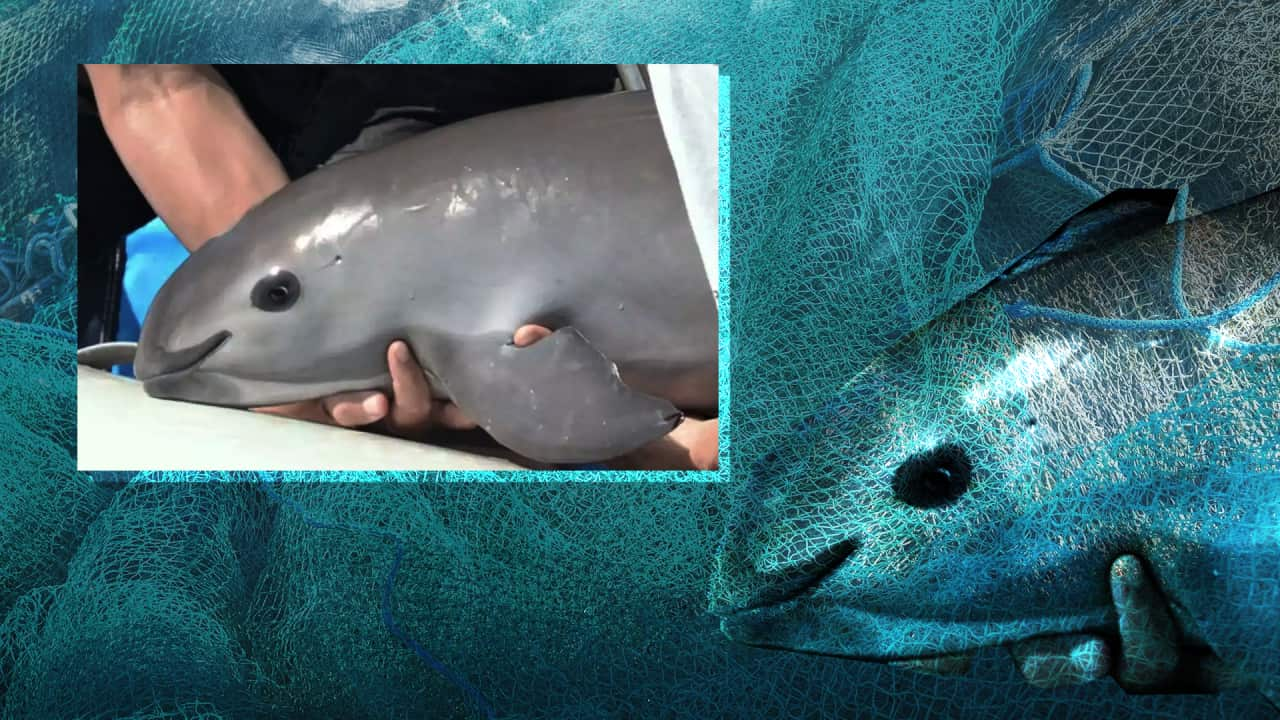Endemic to the Sea of Cortez, in the Upper Gulf of California in Mexico, the vaquita is a species of porpoise which has been pushed to the brink of extinction.
The rapid decline of the species is due to illegal fishing. While the vaquita are not the target of illegal fishermen, they are the same size as the highly prized and critically endangered totoaba fish. When a vaquita gets caught in a gillnet, it drowns within minutes as a by-catch.
The totoaba fish is widely dubbed ‘the cocaine of the sea’, being more valuable than cocaine in Mexico. Its swim bladder is used in traditional Chinese medicine and can fetch anything between $30,000 and $100,000 per kilogram on the black market.

Fishermen with an illegal haul of totoaba. Credit: Earth League International
Andrea Crosta is the founder of Earth League International and worked covertly in the Sea of Cortez to investigate and identify these underground networks and supply chains.
“It led to the dismantling of one of the six different totoaba cartels,” Crosta told SBS Dateline.
“There are five similar cartels operating in Mexico actively trafficking totoaba as we speak, so it’s important to continue this effort to investigate these cartels, especially the international connection, and how they smuggle and sell this fish to Asia.”

Andrea Crosta holding a dried totoaba swim bladder. Credit: Earth League International
“All these networks are involved in many other crimes that are not environmental crimes,” he said.
“We research environmental crime convergence … usually money laundering, human smuggling and drug trafficking are exactly the same people.”
‘The end of a species’
Inside the Vaquita Protection Refuge, all commercial fishing is banned, but for NGO’s it’s a constant battle to keep fishermen in line with the law.
In 2020, one fisherman died and another was seriously injured after their fishing boat collided with a larger ship belonging to conservation group Sea Shepherd that was taking up gillnets.
“It’s never-ending work,” Crosta said.
“I’m not sure we are on time to save the vaquita, because there are less than 10 vaquita left.
“We are witnessing in real time the end of a species.”
All these networks are involved in many other crimes that are not environmental crimes.Andrea Crosta
Sea Shepherd Conservation Society has worked since 2015 to remove thousands of fishing nets from the Vaquita Protection Refuge.
Pritam Singh is the chairman of the board and CEO of Sea Shepherd Conservation Society USA. He recently visited the crew protecting the vaquita in the Gulf of California.
“For many years, Sea Shepherd worked with the government of Mexico and many other non-profits, and the strategy was the fishermen would go out and leave the nets there with buoys and we’d hunt them down and pull them up,” Pritam Singh
“So the fishermen stopped leaving their nets out there and now they only fish with the nets of their boats, so you can see exactly what they are doing.”

Pritam Singh pulls up a fishing net in vaquita habitat. Credit: Sea Shepherd.
“We are able to see the fishermen as they come out to fish and if they come into the protection zone we report them to the navy.
“The nets don’t get into the water and they don’t stay in the water because we chase them out.
“We can’t quit - we need to be present all the time, it’s like being a warden.”
For conservation groups, it’s dangerous work. Singh says Sea Shepherd vessels have been attacked countless times.
“We’ve had everything, shooting at us, it’s wild stuff, but yet our crews keep doing it.”

The Sea Shepherd crew working with radars to protect the vaquita. Credit: Kadija Ege/Sea Shepherd
“These fish are just seen as floating, swimming dollar signs,” Singh told SBS Dateline.
“There is an end to everything with industrial fishing, if overfishing continues, eventually they’ll just kill everything.
“But there’s hope - scientists are saying there are less than 10 vaquita but they can make a comeback … and the government of Mexico is really showing up and has changed this year in terms of their follow through.”
At a recent press conference, Mexico’s naval chief said the government had installed radar-equipment around the vaquita refuge.
Since 2019, Mexican officials have conducted a series of raids and arrested several members of transnational criminal organisations driving the illegal totoaba trade.










